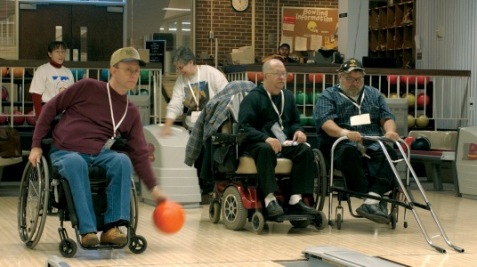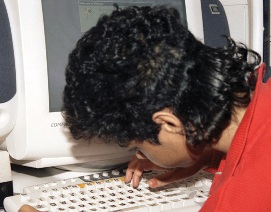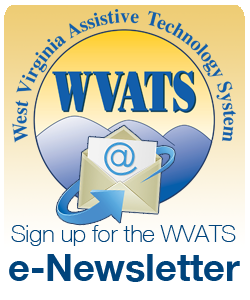Assistive Technology Laws / Policy
Download a PDF of this Document

Listed below are a few important laws and policies that impact assistive technology. Because Federal laws are amended regularly, web site addresses and phone numbers are listed that will provide current up-to-date information on the laws and policies.
Americans with Disabilities Act (ADA) Prohibits discrimination on the basis of disability in employment, state and local government, public accommodations, commercial facilities, transportation and telecommunications. The law has four sections, or "Titles".
For more information about the Americans with Disabilities Act, you can go to the following web sites www.usdoj.gov/crt/ada/cguide.htm or www.ada.gov.
For general ADA information, answers to specific technical questions, free ADA materials or information about filing a complaint, call 800-514-0301 (Voice) or 800-514-0383 (TTY).
Individuals with Disabilities Education Act (IDEA) Was initially passed in 1975. That law, known as the Education for All Handicapped Children Act guaranteed that eligible children and youth with disabilities would have a free and appropriate public education (FAPE) designed to meet their educational needs. IDEA has been amended many times since passing in 1975, and most recently in 2004.
Children with disabilities sometimes need and are entitled to special equipment and services to ensure they have access to a free and appropriate education. During the Individualized Education Program (IEP) process, assistive technology must be considered for every child and then provided if required in a child's IEP to access a free and appropriate public education.
For more information about IDEA, you can visit the following web site www.ed.gov/policy/speced/guid/idea/idea2004.html or call the West Virginia Office of Special Programs, Extended & Early Learning (OSP) at 800-642-8541.
West Virginia Birth to Three Is authorized and partially funded under Part C of the Individuals with Disabilities Education Act. All eligible children and their families are entitled to an array of early intervention services. Assistive technology is one of several services that may be identified as needed on an eligible child's Individual Family Service Plan (IFSP). Eligibility is based on several factors.

Services are administered by the Department of Health and Human Resources, Bureau for Public Health, Office of Maternal, Child and Family Health in cooperation with the Early Intervention Interagency Coordinating Council (ICC).
For more information, call 800-642-9704 or visit www.wvdhhr.org/mcfh/birth23.
Rehabilitation Act Includes provisions for the use of assistive technology in post-secondary training and workplace accommodations.
Section 504 of the Rehabilitation Act Prohibits discrimination on the basis of disability in programs conducted by Federal agencies, in programs receiving Federal financial assistance, in Federal employment and in the employment practices of Federal contractors. The standards for determining employment discrimination under the Rehabilitation Act are the same as those used in Title I of the Americans with Disabilities Act.
Section 504 prohibits discrimination to service availability, accessibility, delivery, employment and the administrative activities and responsibilities of organizations receiving Federal financial assistance.
For more information about Section 504 go to www.hhs.gov/ocr/504.html or call 800-368-1019 (Voice) or 800-537-7697 (TDD).
Section 508 of the Rehabilitation Act Requires that all electronic and information technologies developed and used by any Federal government agency must be accessible to people with disabilities. This includes web sites, video and audio tapes, electronic books, televised programs and other media. Individuals with disabilities may still have to use special hardware and/or software to access the resources. Section 508 does not apply to the private sector or to organizations that receive Federal funds.
For more information about Section 508 go to www.section508.gov or call 202-501-4906.
Assistive Technology Act Also known as the 'Tech Act' provides funds to states to support an assistive technology state plan to increase access to and acquisition of assistive technology for individuals with disabilities in education, employment, community living and information technology/telecommunications.
For more information about West Virginia's Assistive Technology Act program contact the West Virginia Assistive Technology System (WVATS), at West Virginia University Center for Excellence in Disabilities. Call 800-841-8436 or visit wvats.cedwvu.org.
Protection and Advocacy for Assistive Technology (PAAT) Is designed to increase access to assistive technology (AT) for individuals with disabilities. To be eligible, a person must have a disability and be in need of an assistive technology device or service.
PAAT can help a person obtain funding for a device that needs to be purchased or modified for the purpose of increasing their independence. The scope of PAAT's advocacy may include (but is not limited to) providing information, negotiating policy changes, or formally challenging denials and barriers.
West Virginia Advocates provide the PAAT program in West Virginia. Call 304-346-0847 (voice/TDD), 800-950-5250 (voice/TDD) or visit www.wvadvocates.org for more information.
Medicare Law Medicare is a federally funded system of health and hospital insurance for U.S. citizens age sixty-five or older, for younger people receiving Social Security benefits and for persons needing dialysis or kidney transplants for the treatment of end-stage renal disease.
Medicare will pay for services and equipment that it deems reasonable and necessary. A prescription from a professional such as a physician that describes your condition and how the device in question will help you is needed for services.
For more information, call 800-MEDICARE (800-633-4227) or (TTY) 877-486-2048 or visit www.medicare.gov.
Medicaid Law Medicaid is a medical assistance program jointly financed by state and federal governments for low income individuals.
For more information, visit www.cms.hhs.gov/home/medicaid.asp or call your local Health Department.
Health Check (EPSDT) Children under the age of 21 who receive Medicaid can participate in the Early and Periodic Screening, Diagnosis and Treatment (EPSDT) Program. A child may receive Medicaid and EPSDT even if the family does not qualify for Medicaid. Children are entitled to many medically necessary services under the EPSDT Program including assistive technology devices that are prescribed by a doctor.

The Agent Orange Benefits Act Establishes benefits for Vietnam veterans' children born with spina bifida. Benefits include: lifetime health care services for spina bifida and 'any disability associated' with spina bifida, a monthly monetary allowance, Veterans Affairs vocational training and rehabilitation services. Durable Medical Equipment (DME) and equipment and supplies needed for rehabilitation are covered under the Act.
Spina bifida coverage was extended by two laws: The Women's Vietnam Veterans' Children's Birth Defect Benefits Act of 2003 extended spina bifida coverage to children of women veterans. The Veteran's Benefit Act of 2003 expanded benefit eligibility to children with spina bifida who were born to certain Vietnam-era veterans who served in Korea near the demilitarized zone.
The Spina Bifida Program provides monetary allowances, vocational training and rehabilitation to birth children with spina bifida. It covers most health care services and supplies, including assistive technology that is medically or psychologically necessary for the treatment of conditions related to spina bifida.
For more information or to initiate the application process, call 800-827-1000.
The Hearing Aid Compatibility Act of 1988 Requires that all telephone equipment manufactured or imported for use in the United States after August 1989 be compatible with hearing aids.
For more information, visit www.fcc.gov/cgb/dro or call the FCC's Consumer Center at 888-CALL-FCC (888-225-5322) (Voice) or 888-TELL-FCC (888-835-5322) (TTY).
The Television Decoder Circuitry Act of 1990, Section 3 States that people who are deaf or hearing impaired should have access to information and entertainment via television medium to the fullest extent possible through technology. This law requires that new televisions with at least a 13-inch screen must have the built-in capacity to display closed-captioned TV transmissions.
For more information, visit www4.law.cornell.edu/uscode/unframed/47/303.html.
Telecommunications Act of 1996 Title I requires that telecommunications equipment and services be accessible to and usable by persons with disabilities. For more information, visit www4.law.cornell.edu/uscode/unframed/47/225.html. Title III discusses rules on closed captions and video descriptions of video programming.
For more information, visit www.fcc.gov/telecom.html or call the FCC's Consumer Center at 888-CALL-FCC (888-225-5322) (Voice) or 888-TELL-FCC (888-835-5322) (TTY).
Workforce Investment Act of 1998 In the vocational rehabilitation process, this law defines assistive technology and its use in job planning, acquisition and retention of people with disabilities.
For more information, visit www.doleta.gov/usworkforce/wia/act.cfm or call the U.S. Department of Labor at 877-US-2JOBS (877-872-5627).
Help America Vote Act Was passed by Congress in 2002 to ensure that every American has equal access to the polls. Federal funding is distributed to each state to ensure that every polling site has at least one accessible voting machine for private and independent voting by persons with disabilities.
For more information, visit www.fec.gov/hava/hava.htm or call the Federal Election Commission at 800-424-9530 or 202-219-3336 (TTY).
West Virginia Assistive Technology System
Center for Excellence in Disabilities at West Virginia University
959 Hartman Run Road
Morgantown, WV 26505
(800) 841-8436
e-mail: wvats@hsc.wvu.edu
All printed materials are made available in braille, electronic format, cassette tape and large print.

